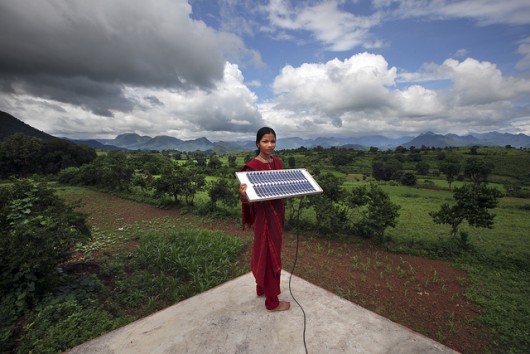Solar Power in Developing Countries: An Affordable Future?
 Nonprofit, INTASAVE-CARIBSAVE Group is seeking to improve lives globally by introducing solar power in developing countries.
Nonprofit, INTASAVE-CARIBSAVE Group is seeking to improve lives globally by introducing solar power in developing countries.
While those who grew up in the United States may take electric devices such as heaters and computers for granted, many people around the world remain off-the-grid. According to INTASAVE-CARIBSAVE’s website, about 1.5 billion people worldwide currently do not have access to energy.
The organization believes that introducing solar power in developing countries will be a key strategy for reducing the negative effects of global poverty. Access to electricity translates to better health, nutrition and overall quality of life.
The vision of INTASAVE-CARIBSAVE is to help build a “world that responds to the opportunities and challenges of a changing climate and provides an equitable and sustainable future for all.” In order to achieve this goal, the organization focuses on using innovation to create solutions for problems facing communities in developing countries.
One of the most recent projects has been efforts to bring energy to rural Africa through solar power advancement. INSTASAVE’s energy division has expertise in developing Solar Nano Grids – or “SONGs” – which are designed to work efficiently and be installed easily in even the remotest of locations.
The SONGs bring clean, affordable energy, which does not burden African families with burdensome equipment. The devices do not even use cables, like the outdated and cumbersome grid model offered to rural communities.
The implications of INSTASAVE-CARIBSAVE’s efforts are vast and powerful. Not only does clean energy improve life expectancy and healthcare outcomes by bringing reliable electricity to hospitals and pollution from charcoal-burning out of homes, but it also has the potential to empower entrepreneurs in their businesses. For example, a cattle farmer with access to power can keep milk up for sale longer with the help of an electric refrigerator.
Dr. Murray Simpson is the mastermind behind this important branch of the nonprofit’s work. “It’s not energy just for energy’s sake, but actually providing positive impacts in terms of development,” Simpson said in an interview with Planet Experts. He explained that this work empowers women and helps children in terms of health and education. “It means micro-credit and environmental impacts, building impacts, and enabling micro-enterprise and entrepreneurialism across the African continent,” he said.
– Jen Diamond
Sources: Intasave, Enviroliteracy , Huffingtonpost, Planet Experts
Photo: Flickr
